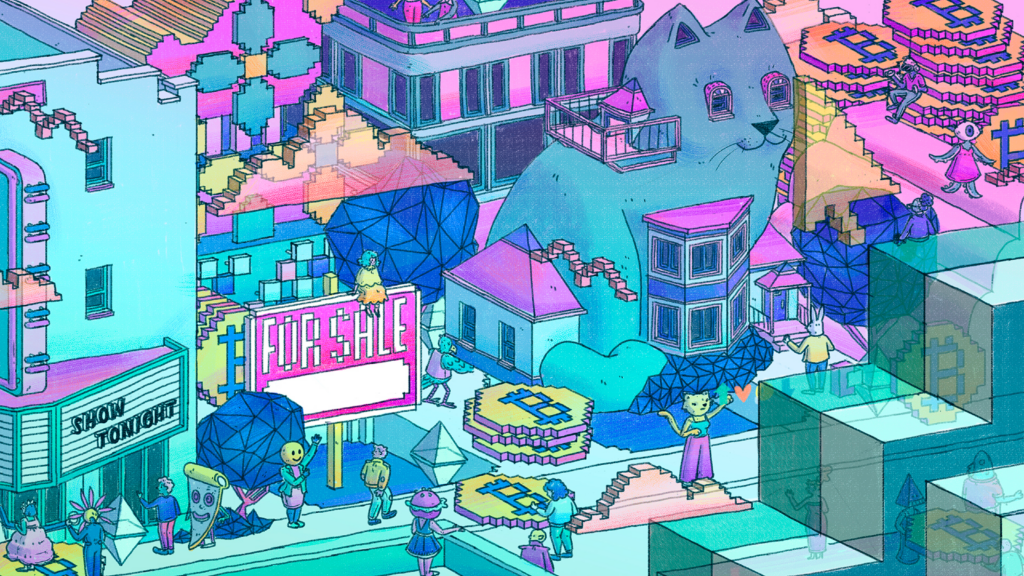The world of real estate has undergone a massive transformation lately with the rise of Non-Fungible Tokens (NFTs). These unique digital assets, powered by blockchain technology, are creating a new level of industry transparency, security, and ownership rights. From virtual reality-based virtual tours and virtual property ownership to the tokenization of real-world assets, the potential for NFTs in real estate is vast, poised to disrupt the traditional real estate market.
But what exactly are NFTs, and how are they transforming the real estate sector? This article will explore the benefits and threats of investing in NFT real estate, the practical considerations to follow, and the legal implications of this new technology.
So, What are NFTs?
In simple terms, NFTs are digital tokens representing unique assets, such as real estate. Each NFT is a unique and irreplaceable digital certificate of ownership securely recorded on a blockchain, making it tamper-proof and providing an immutable record of ownership. As a result, NFTs can revolutionize how we buy, sell, and own real estate.
Benefits of Investing in NFT Real Estate
One of the most significant benefits of investing in NFT real estate is the potential for capital gains. As with any investment, the price of NFTs is subject to market dynamics, meaning their value can rise and fall. Additionally, owning an asset not subject to traditional property taxes can result in significant cost savings.
Another advantage of investing in NFT real estate is its immunity to physical damage. Unlike traditional real estate, which can be destroyed or lost, digital assets can be traded from anywhere in the world, providing greater flexibility and security for investors.

Threats of Investing in NFT Real Estate
Despite their benefits, NFT real estate investments also pose potential threats. The market is still relatively new and subject to volatility. Moreover, security breaches can occur, leading to the loss of investment. Therefore, thorough research into the underlying technology and the property’s value is crucial before investing in any NFT real estate.
Considerations When Investing in NFT Real Estate
When investing in NFT real estate, several key considerations must be remembered. Firstly, evaluating the platform on which the token is based is essential. In addition, the infrastructure must be robust enough to handle large amounts of transactions, and security measures must be in place to safeguard your investment.
Another crucial factor to consider is liquidity and the ease you can get out of an investment. Before investing, research secondary markets where people can buy and sell the tokens, as having a solid marketplace is critical for swift transactions and higher returns.
Finally, consider the team behind the project. Do they have a good track record in developing successful NFT projects? Do they have a clear roadmap for how they plan to achieve their goals? Understanding the project’s direction will help determine whether it’s worth investing in.
Virtual Properties and Fractional Ownership
One of the most exciting aspects of NFT real estate is the ability to represent virtual properties, such as virtual land, in online gaming or virtual reality worlds. Furthermore, NFTs enable fractional ownership, allowing multiple investors to own a share of the property. This makes it possible for investors to invest in properties they might not have been able to afford otherwise, creating opportunities for real estate crowdfunding.
Legal Implications of NFT Real Estate
The legal implications of NFT real estate are still largely undefined. While NFTs generally fall under existing laws, unique legal issues regarding property and money must be addressed, including implications for taxes, insurance, and transferring ownership. Therefore, it is crucial to stay up-to-date with any changes in the law that apply to this field.
Becoming an NFT Real Estate Expert
To become an NFT real estate expert, it’s essential to understand the fundamentals of how NFTs work and the technology used to create them. Knowledge of digital marketplaces’ structures and their interaction with blockchain technology is also crucial in assessing worthwhile investments. Additionally, understanding the legal implications of NFT real estate is essential, as it is still an emerging field with undefined legal boundaries.
The Future of NFT Real Estate
As the market for NFT real estate continues to evolve, it’s clear that NFTs are set to change how we think about real estate ownership and investment. The potential for NFTs in real estate is vast, from virtual reality-based virtual tours and virtual property ownership to the tokenization of real-world assets. With transparency, security, and ownership rights benefits, NFTs are poised to disrupt the traditional real estate market and bring new opportunities for investors and property owners alike.

Final Thoughts
NFTs are revolutionizing the real estate industry, providing greater transparency, security, and ownership rights. While investing in NFT real estate presents potential threats, the benefits, including capital gains and immunity to physical damage, make it an attractive investment opportunity. When investing in NFT real estate, it’s essential to consider the platform on which the token is based, liquidity and ease of investment, and the team behind the project. As the market continues to evolve, it will be exciting to see what new developments arise and how this technology will shape the future of the real estate industry.

